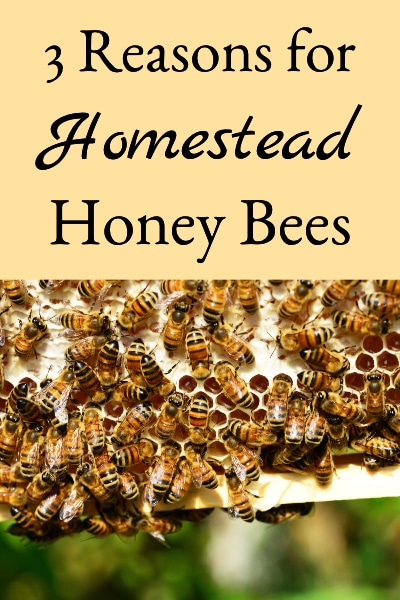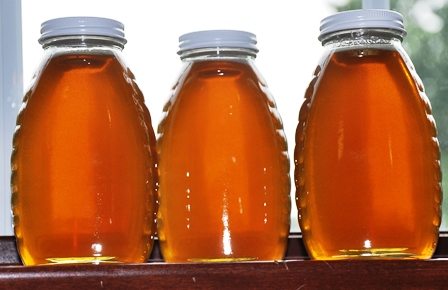The 3 reasons for homestead honey bees that we feel are most important are described below. This is the time of year when we review what we’ve been growing, harvesting, and selling from Bramblestone Farm, and try to make plans for the 
Honey Bees Are Profitable
You do have to invest in the hives, bees, and basic equipment at first; but, once you get set-up the honey bees do most of the work. They require regular inspection and hive management but are a lot less time intensive than most things on the homestead. We’ve found that local honey sells very quickly, and although we keep increasing the number of hives, we invariably sell out of honey.
The going rate for pure, local honey from an organic or natural farm here is around $9.00 – $12.00/lb., and we usually harvest between 75 – 100 pounds from each hive. We could probably harvest more, but we want to make sure that the honey bees have enough to survive too.
Each year we’re hoping to harvest from at least five hives (you can do the math on profitability). Products like infused honey, creamed honey, and lip balm made with bee’s wax and honey are also very popular, so we’d like to expand into those in the too.
Today, it seems that many are very interested in finding and consuming wholesome, natural foods and products, and there’s not much more wholesome and good for you than local honey (see “Reasons To Buy Raw, Local Honey” for more on this).

Better Produce Yields
In order to produce food, plants require a few things. For some plants, pollinators are required because they’re incapable of producing fruit without them. Popular plants that require pollination include apple, blueberry, cucumber, pumpkin, raspberry, squash, and watermelon. Other plants self-pollinate, but honey bee pollination significantly increases the abundance and size of the plant yield. Plants that benefit from pollination include beans, eggplant, peppers, potatoes, strawberries, and tomatoes.
We were amazed at the increase in produce yields that we saw after getting honey bees. I always thought that I was just lousy at growing things like cantaloupe and watermelon, but it wasn’t me – it was a lack of bees! So in addition to profiting from selling things like honey and honey products, bees are beneficial because they increase the yields of produce from the homestead.
 They’re Important
They’re Important
Honey bees are important because their pollination is estimated to be responsible for producing one-third of the food we eat worldwide. According to a recent United Nations study, 70 out of the 100 most important food crops in the world must be pollinated by bees.
Without enough pollinators, crop yields decline and the varieties of foods that can be produced diminish. But the bees are in trouble; since 2006 they have been dying off, in part due to exposure to systemic and other pesticides (see “Help Honey Bees – They’re Important” for more information).
So, honey bees need beekeepers who will look out for them and protect them from exposure to the things that have been killing them off. We’ve found that they work very hard, are well worth the investment, and have earned their place on the homestead.

Pia Sonne says
Three good reasons! Bees are actually the first animals I want to add once we get some land.
Until then we gladly pay the price for real honey from a local beekeeper we know and trust. Well worth it during allergy season.
Lisa Lombardo says
I would love to have bees…I’m not sure if we will stay where we are long term so I’ve been unsure about getting started.
Jennifer Cook says
I wish we could do the bees but I am allergic and so we get ours from some friends who do have bees. Well worth the price for local raw honey!
Lesa says
Hi Jennifer, thanks for supporting your local beekeepers – it’s hard work and the bees are important!
AnnMarie Lewellyn says
It amazes me the price of pure honey nowadays and it is exactly why we are getting started with bees this year! Bees are about the only thing we don’t have happening on the homestead yet. But I sure am excited to know they are on the list of plans this year! Thanks for the great information!
Lesa says
Good luck with those bees Annie!